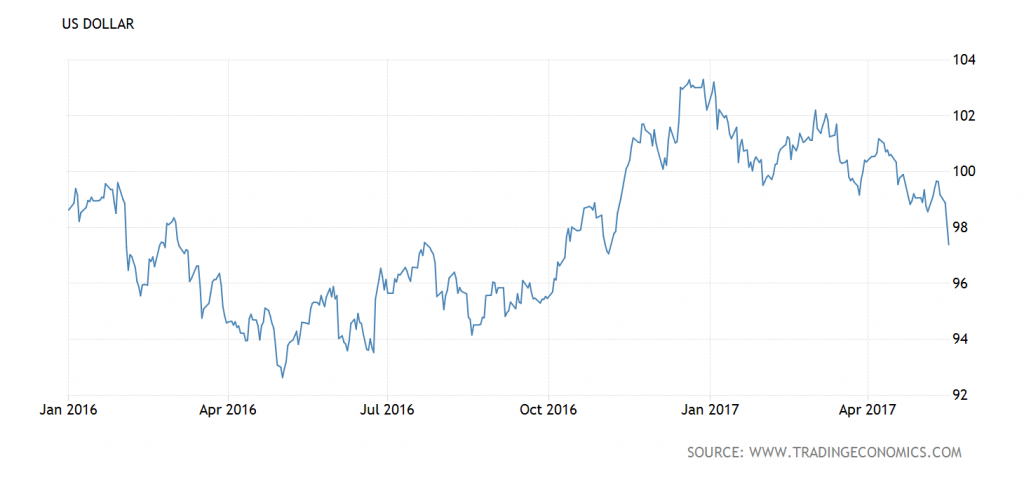Mix together the dashing of great (plutocratically oriented tax cut) expectations, the complete absence of any plan for infrastructure spending, and mix in some risk, and one gets this:

Figure 1: Dollar index (DXY). Source: Tradingeconomics.
Category Archives: international
“Exchange Rate Models for a New Era: Major and Emerging Market Currencies”
That’s the title of an upcoming conference organized by Global Research Unit at Department of Economics and Finance, City University of Hong Kong, Bank for International Settlements, Asian Office, Centre for Economic Policy Research, and Journal of International Money and Finance, May 18-19 at City University Hong Kong. The conference program is here, official conference website here.
Guest Contribution: “How to Re-Negotiate NAFTA”
Today, we present a guest post written by Jeffrey Frankel, Harpel Professor at Harvard’s Kennedy School of Government, and formerly a member of the White House Council of Economic Advisers. A shorter version appeared on April 22nd in Project Syndicate.
China’s tetralemma
Many countries have three policy objectives: (1) being able to set their own monetary policy, in order to keep their own inflation and unemployment at desired levels; (2) having a stable exchange rate, in order to avoid disruptive shifts in exports or imports; and (3) allowing free capital flows, in order to help the country’s citizens and firms find the most efficient sources and uses of capital. But the famous policy trilemma of international economics claims that any country is going to be forced to give up on one of those three goals.
Continue reading
“Major Challenges for Global Macroeconomic Stability: The Role of the G7”
That was the title of a conference organized by Istituto Affari Internazionale (with support of the Italian Ministry of Foreign Affairs and International Cooperation and Banca d’Italia) that I attended a couple of weeks ago in Rome.
First Year 2017: “The Uncertain Future of Globalization”
The First Year Project is a multi-year, non-partisan effort to (1) Examine the history and structure of presidential First Years, (2) Assess the policy opportunities and threats for our next President, and (3) Influence the national debate by addressing candidates, opinion leaders, and the public.
“The Future of the EU and Trans-Atlantic Relations”
That’s the topic of this year’s La Follette Spring Symposium, being held Thursday, April 6th at the University of Wisconsin-Madison (Discovery Building, 330 N. Orchard Street, Madison).
Guest Contribution: “Mnuchin, Multilateral Meetings, Money Manipulation, and Message Mayhem”
Today, we present a guest post written by Jeffrey Frankel, Harpel Professor at Harvard’s Kennedy School of Government, and formerly a member of the White House Council of Economic Advisers. A shorter version appeared on March 22nd in Project Syndicate.
How Financially Open Is the World?
Hiro Ito, who updates our de jure financial openness index (sometimes known as the Chinn-Ito index), has recently calculated GDP-weighted averages of the indices for country categories. The stylized facts regarding the evolution of openness changes, particularly with regard to emerging market economies.
National Security and Trade Deficits
National Trade Council Director Peter Navarro writes in the WSJ:
The national-security argument that trade deficits matter begins with this accounting identity: Any deficit in the current account caused by imbalanced trade must be offset by a surplus in the capital account, meaning foreign investment in the U.S.